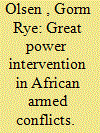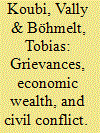| Srl | Item |
| 1 |
ID:
139005


|
|
|
|
|
| Summary/Abstract |
This paper asks why the United States (US), China and the European Union (EU) have intervened in a number of armed conflicts in Africa in the twenty-first century. Scrutiny and comparison of the motivations and interests of the three non-African actors in intervening in African crises are assumed to contribute to understanding the changing geopolitical environment and the current conditions for conflict management in Africa. The focus is not on trade and aid. The paper launches the hypothesis that the explanations why the US, China and the EU have intervened are basically identical. In spite of different evaluations of the specific crisis situations, the interventions have been about taking care of the ‘national interest’ of each of the three non-African actors. National interest is defined as either ‘hard core’ (security) or ‘core’ concerns (security and economic wealth).
|
|
|
|
|
|
|
|
|
|
|
|
|
|
|
|
| 2 |
ID:
128854


|
|
|
|
|
| Publication |
2014.
|
| Summary/Abstract |
One of the most robust findings in the literature on civil conflicts is that high income levels are associated with a lower risk of conflict onset. This article addresses the wealth-conflict link and discusses it in relation to the dominating `greed vs. grievance' dichotomy. It is further argued that the effect on conflict of grievances, in the form of horizontal inequalities, is conditioned on national wealth. More specifically, there may be a higher risk of civil war in those countries that have much wealth, but where a large share of the population is potentially excluded from accessing it. The empirical analyses testing this argument employ time-series cross-section data for 1951-2004 and find support for the theory. The authors also show that taking this conditional relationship into account improves our ability to predict the onset of civil conflict.
|
|
|
|
|
|
|
|
|
|
|
|
|
|
|
|
| 3 |
ID:
130578


|
|
|
|
|
| Publication |
2014.
|
| Summary/Abstract |
In the context of mineral extraction in South East Asia, the rural poor are generally portrayed as victims of large, invading corporatized mining enterprises. However, this paper argues that local villagers have also shown considerable agency in taking advantage of the mineral resource boom by diversifying their livelihoods to include informal mining. In South East Asia, the growth of informal mining has occurred within the overall process of agrarian transition. This paper focuses on a mineral-rich valley in southern Laos to highlight the location-specific nature of such transitions. The valley's environmental transformation has both caused and accompanied a modification in the peasant ways of life, and the recent entry of transnational mining companies and the growing market price of tin have fundamentally altered the relationships of the peasants with place, while at the same time encouraging them to claim mineral resource rights in ways that are not accommodated in conventional mining legislation. To conclude, the paper notes the multiple interpretations and contradictions of the increasing mineral dependence among Lao peasants in a rapidly changing world.
|
|
|
|
|
|
|
|
|
|
|
|
|
|
|
|